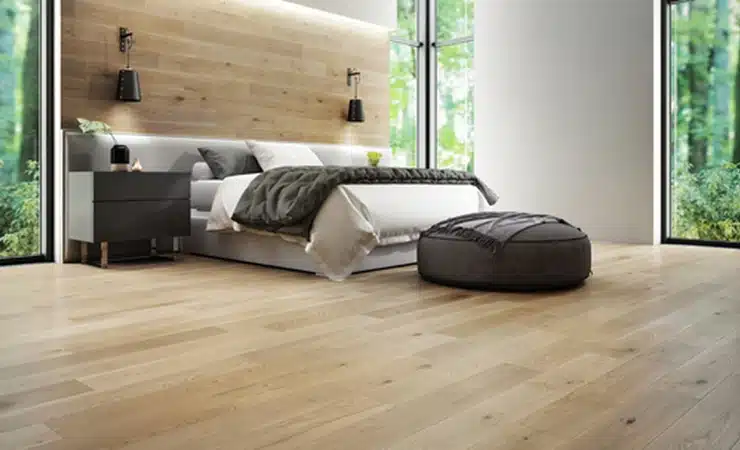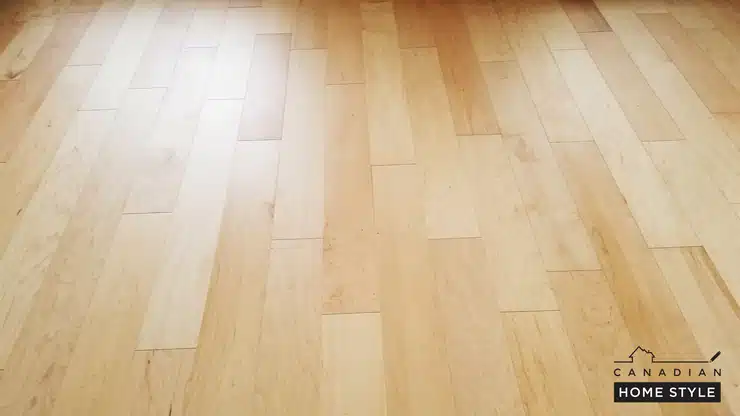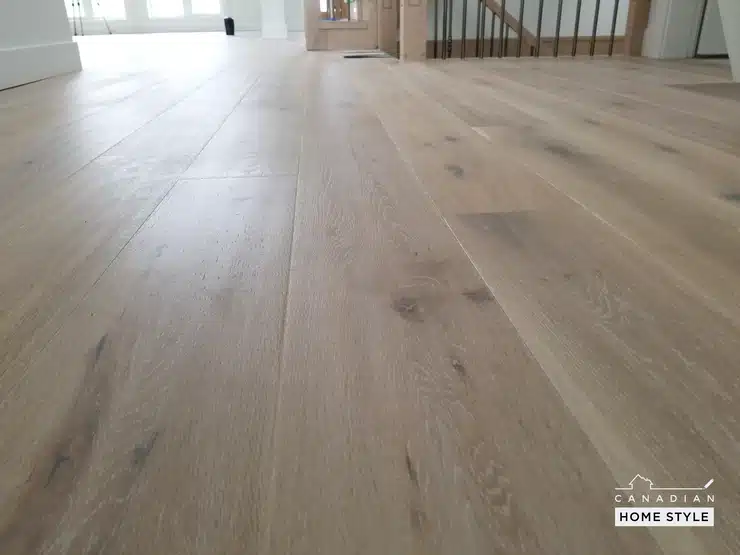
Depending on the size of your home, the price for hardwood flooring can range from $6 to $30 SF. This includes the cost of solid wood, engineered wood, and factory-finished wood flooring. Before looking for a hardwood flooring installer, consider how much your flooring project will cost. Most certified installers charge between $3 (floating) to $12 (herringbone) SF for hardwood installation in Metro Vancouver.
Understanding Hardwood Flooring Costs: A Comprehensive Guide
Hardwood flooring is a classic choice for homeowners, combining elegance and durability. The price of hardwood flooring is influenced by various factors, including the type of wood, quality, and installation complexity. Oak, maple, and cherry are popular options, each with unique grains and color tones. Premium woods like mahogany come at a higher cost due to their exquisite appearance and long lifespan. The thickness and size of the planks can also impact the price, with wider planks often commanding a higher price for their visually striking effect.
The cost of installation varies depending on the method used. Floating floors, where the planks interlock and sit over a subfloor, offer a cost-effective solution. Traditional nail-down installations require more labor, which can increase the overall cost. The labor cost itself can vary based on geographical location and the expertise of the installer. It’s important to consider these factors when budgeting for hardwood flooring installation.
Maintenance is another aspect to consider when choosing hardwood flooring. Regular cleaning and occasional refinishing are necessary to keep the floors looking their best. However, hardwood floors are known for their durability and can withstand heavy foot traffic and everyday wear and tear. With proper care, hardwood flooring can last for decades, making it a worthwhile investment for homeowners.
In terms of environmental impact, hardwood flooring can be a sustainable choice. Many hardwood species used for flooring come from responsibly managed forests, ensuring the long-term health of the ecosystem. Additionally, hardwood floors can be recycled or repurposed at the end of their life, reducing waste and minimizing environmental impact. It’s important to choose hardwood flooring from reputable sources that prioritize sustainability.
When it comes to style and design, hardwood flooring offers endless possibilities. The natural beauty of wood adds warmth and character to any space. Different wood species and finishes can create various aesthetics, from traditional to contemporary. Hardwood flooring also pairs well with different interior design styles, allowing homeowners to create a cohesive and visually appealing look throughout their home.
In terms of health and indoor air quality, hardwood flooring is a favorable choice. Unlike carpets, hardwood floors do not trap dust, allergens, or pet dander, making them easier to clean and maintain. This can contribute to better air quality, especially for individuals with allergies or respiratory conditions. Additionally, hardwood flooring does not emit harmful chemicals or volatile organic compounds (VOCs), promoting a healthier indoor environment.
When it comes to resale value, hardwood flooring is often considered a desirable feature by potential buyers. It adds a touch of luxury and sophistication to a home, increasing its overall appeal. Homes with hardwood flooring tend to sell faster and at higher prices compared to those with other types of flooring. This makes hardwood flooring a wise investment for homeowners looking to increase the value of their property. For more detailed information on hardwood flooring types and their costs, visit the National Wood Flooring Association’s website here.
Factors Influencing Hardwood Flooring Prices
The price of hardwood flooring isn’t just about the material. Several other factors contribute to the final cost. The finish of the wood, whether prefinished or site-finished, plays a significant role. Prefinished woods are convenient and time-saving but might come with a higher price tag. On the other hand, site-finishing offers customization at possibly lower costs but requires more installation time.
Room size and layout also impact the cost. Larger areas require more material and labor, while complex layouts with lots of corners and cuts can increase waste and labor expenses. Subfloor preparation is crucial as well, as any issues with the subfloor can lead to additional costs.
The type of wood chosen for the flooring can affect the price as well. Some hardwood species are more expensive than others due to their rarity or unique properties. Additionally, the grade of the wood, such as select or rustic, can also impact the cost. Higher-grade woods tend to be more expensive.
Installation method is another factor to consider. Floating floors, where the planks are not attached to the subfloor, are generally less expensive to install compared to nail-down or glue-down methods. However, the choice of installation method may depend on the specific requirements of the project.
In addition to the material and installation costs, there are other expenses to consider. These include underlayment, which provides additional support and insulation, as well as trim and molding to complete the look of the flooring. These additional components can add to the overall cost.
Maintenance and durability should also be taken into account. While hardwood flooring is known for its longevity, certain finishes or treatments may require more frequent maintenance or refinishing, which can incur additional costs over time. It is important to choose a flooring option that aligns with your budget and maintenance preferences.
Lastly, it is worth considering the long-term value of hardwood flooring. While the upfront cost may be higher compared to other flooring options, hardwood floors can increase the resale value of a home and provide a timeless aesthetic appeal. This potential return on investment should be factored into the overall cost analysis. For insights on how room size and layout affect flooring costs, visit Floor Critics’ comprehensive guide here.
Hardwood Flooring Pricing Trends and Market Analysis
The hardwood flooring market is constantly changing, with pricing trends influenced by global supply chains, fluctuations in demand, and advancements in technology. Sustainable and eco-friendly flooring options are gaining popularity and often come with a higher price tag due to their environmental benefits and innovative manufacturing processes. Engineered hardwood floors have become more accessible and affordable thanks to technological advancements in production. These floors provide the authentic look of real wood at a fraction of the cost and are easier to install.
Transitioning to the next paragraph, it’s important to note that hardwood flooring is a versatile and durable option for homeowners. It adds warmth and elegance to any space, whether it’s a residential or commercial setting. With a wide range of styles, colors, and finishes available, there is a hardwood flooring option to suit every taste and design aesthetic. Additionally, hardwood floors are known for their longevity and can withstand heavy foot traffic, making them a practical choice for high-traffic areas.
Moving on, it’s worth mentioning that hardwood flooring offers a timeless appeal that never goes out of style. Unlike other flooring options that may need to be replaced after a few years, hardwood floors can last for decades with proper care and maintenance. This long lifespan not only adds value to a property but also reduces the need for frequent replacements, making it a cost-effective choice in the long run. Furthermore, hardwood floors can be refinished multiple times, allowing homeowners to change the color or revive the surface without the need for a full replacement.
Shifting gears, let’s talk about the environmental benefits of hardwood flooring. As mentioned earlier, eco-friendly and sustainable flooring options are gaining traction in the market. Hardwood flooring, particularly those certified by organizations like the Forest Stewardship Council (FSC), are sourced from responsibly managed forests. This ensures that the wood used for flooring comes from sustainable sources, promoting the conservation of forests and biodiversity. Additionally, hardwood floors are a natural and renewable resource, as trees can be replanted to replace those that are harvested.
In addition to their environmental benefits, hardwood floors also offer health advantages. Unlike carpets, which can trap allergens, dust, and pet dander, hardwood floors are easy to clean and maintain. This makes them a great choice for individuals with allergies or respiratory conditions. Furthermore, hardwood floors do not emit harmful chemicals or volatile organic compounds (VOCs) that can negatively impact indoor air quality. This promotes a healthier living environment for occupants. Keep up with the latest market trends by checking out reports from the Flooring Industry Council here.
Comparing Hardwood Flooring Costs Across Different Retailers
When shopping for hardwood flooring, it’s important to compare prices across various retailers. Large chain stores might offer competitive prices due to their bulk purchasing power. Local retailers, while possibly more expensive, can provide personalized service and unique product selections.
Online retailers offer the convenience of shopping from home, often featuring a wider range of products. However, it’s crucial to factor in shipping costs, which can add significantly to the overall price.
It’s also worth noting that when purchasing hardwood flooring, the type of wood matters greatly with the price. Common wood types like oak, hickory, and maple, usually have more accessible prices while exotic woods like mahogany or Brazilian walnut tend to be more expensive due to their rarity and unique aesthetics.
Different stores may also offer various kinds of discounts or sale periods, which can help you save money if you’re flexible with your timeline. It’s certainly worth keeping an eye on sales events or newsletters from retailers you’re interested in, as these can often provide valuable information on upcoming discounts or promotions.
Consideration should also be given to warranties and after-sales service. Some retailers might offer longer warranties or comprehensive maintenance services, which could sway your decision if you’re looking for long-term value.
When estimating the total cost, you must factor in installation. This can be a substantial part of the hardwood flooring expense, depending on whether you plan to install it yourself or hire professionals. Large retail chains often provide installation services at discounted rates or sometimes even for free as part of a package deal. Local retailers also have connections with reliable local contractors and might provide recommendations or deals.
Lastly, sustainability and environmental considerations may impact your choice. Reclaimed or recycled wood flooring options are becoming increasingly popular for their minimal environmental impact. Some retailers specialize in such products, appealing to consumers prioritizing green choices.
Overall, while prices are a significant factor in deciding where to buy your hardwood flooring, they shouldn’t be the sole determinant. Quality, variety, warranties, service, and sustainability are equally important factors to consider when choosing the right retailer for your flooring needs. To compare prices from different retailers, visit Consumer Reports’ flooring section here.
Long-Term Value of Investing in Quality Hardwood Flooring
While initial costs are an important consideration, it is crucial not to overlook the long-term value of hardwood flooring. Hardwood floors can last for decades, reducing the need for frequent replacements and providing a durable and reliable option. Additionally, they can significantly enhance the resale value of a home, making them a wise investment.
Maintenance costs should also be taken into account when considering hardwood flooring. Although regular cleaning and periodic refinishing are necessary, the durability of hardwood floors often offsets these expenses. With proper care and maintenance, hardwood floors can maintain their beauty and functionality for many years to come.
In terms of sustainability, hardwood flooring is an environmentally friendly choice. Unlike other flooring options, hardwood is a renewable resource that can be harvested responsibly. This means that by choosing hardwood floors, you are contributing to the preservation of forests and promoting sustainable practices.
Furthermore, hardwood floors offer a timeless and elegant aesthetic that can complement any style of decor. Whether you prefer a rustic farmhouse look or a modern minimalist design, hardwood floors can effortlessly enhance the overall ambiance of your space.
When it comes to health and hygiene, hardwood floors are an excellent choice. Unlike carpets, which can harbor allergens and dust mites, hardwood floors are easy to clean and maintain. This makes them a great option for individuals with allergies or respiratory conditions.
In terms of versatility, hardwood floors offer endless possibilities. They can be stained or finished in a variety of colors and textures, allowing you to customize your floors to suit your personal style and preferences. Additionally, hardwood floors can be installed in any room of the house, from the living room to the bedroom, creating a seamless and cohesive look throughout your home. For more information on the long-term value of hardwood flooring, explore the Real Estate Flooring Association’s insights here.
Cost of engineered hardwood flooring
If you want a beautiful floor that will last for years, consider installing engineered hardwood flooring. Engineered hardwood can be installed in areas where solid wood flooring, like basements or concrete slabs, cannot be installed. You can install them yourself with relatively little experience, too. You’ll need a small saw and patience, but the result will be a beautiful floor that will surely last for years.
The price range of engineered hardwood flooring varies. The price can vary from six to thirty dollars a square foot. This cost does not include labor and deliveries. Factory-finished hardwoods do not require finishing after installation, so they are usually more expensive. If you buy engineered hardwood flooring, check out its thickness before ordering. Also, keep in mind that thicker veneer costs more than thinner. In general, you should be looking to buy engineered hardwood flooring with at least a 3 mm wood veneer.
Engineered hardwood flooring is a great choice for those living in Metro Vancouver. While Engineered hardwood can be more expensive than solid wood, it also gives you flexibility regarding installation method and application. Engineered hardwood flooring comes in various patterns and styles, making your floor look unique. Just be sure to check out the different styles and patterns available at your local flooring dealer to find one that fits your needs.
There are several brands available in the market. However, not all of them are created equally. Different brands have different specifications and prices. While most are similar in quality and durability, it’s important to check out the brand name before making a final decision. If you’re looking for a particular hardwood brand, look for it on the internet and research prices in your area. That way, you’ll get the most bang for your buck.
Cost of solid hardwood flooring
Solid hardwood has to be nailed to a plywood subfloor, and you can normally find only Canadian solid hardwood in Metro Vancouver. The installation of a solid hardwood floor may cost anywhere from $4 to $12 per square foot. Solid wood prices are relatively cheaper than their Canadian engineered counterparts. However, the installation cost can quickly increase when leveling is involved in a flooring project. Prices for solid wood flooring vary depending on several factors, including the wood species, the manufacturer, grading of the wood, and the width.
When sanding and refinishing your wood floors, solid wood is more flexible than engineered wood, allowing for multiple sanding and refinishing. The downside of solid hardwood is that it is not suitable for moist environments. Because wood expands and contracts, experts suggest that it is not ideal for installation on concrete slabs. Otherwise, moisture can seep through and cause the warping of the wood.
Cost of exotic hardwoods
Exotic hardwood flooring can be very expensive. While a traditional wood floor can cost around $6 to $15 per square foot, exotic hardwood flooring can cost up to $40 or more per square foot. Exotic hardwood is usually harvested from tropical areas and comes in vibrant colors. Popular types of exotic hardwood include Brazilian Cherry, Tigerwood, Brazilian Ash, and Brazilian Chestnut. In addition to their stunning looks, these types of flooring can be very durable.
Although there are 23 different types of hardwood flooring, most of which originate in North and South America. Common hardwood types include Alder, Ash, Basswood, Cherry, Cottonwood, Cypress, and Hard Maple. Exotic hardwood floor planks are produced from trees that grow in faraway places, such as Australia, Indonesia, and Southeast Asia. While these species are not endangered, the high cost of installing these floors can be very expensive. But, with proper care, you can enjoy gorgeous, unique, and high-quality flooring without breaking the bank.
In terms of installation time, exotic hardwoods are more expensive than your average wood. Expensive hardwood flooring is harder on the installer’s blade, which drives the cost. Complex room layouts require more time and effort than simple square or rectangular rooms.
The first factor to consider when installing hardwood flooring is the wood’s color. Lighter woods are more light-toned and will give your home a lighter feel. Darker woods, such as mahogany and walnut, will add warmth and depth.
Cost of factory-finished wood flooring
Factory-finished hardwood flooring costs vary depending on your needs, taste, and budget. Prices also vary depending on demand, supply, and finish. Before you purchase a hardwood floor, consider visiting your local flooring store. In addition to the vast selection, these stores often offer great advice on products, installation, and more.
When shopping for hardwood flooring, remember that the price is not the only factor to consider. Some companies offer discounts if you purchase a large quantity of flooring. Others may charge more for shipping and handling. Be sure to choose the right company with a great track record for success. In Metro Vancouver, Canadian Home Style is considered the highest-rated flooring retailer.
Factory-finished hardwood flooring comes with a protective topcoat that’s already applied. This means less time is required for installation compared to unfinished hardwood. Moreover, factory-finished hardwood floors require less sanding, while unfinished ones require you to sand and finish them yourself. That way, you’ll end up saving money in the long run.
Our Recommended Hardwood Flooring Brands:
Mercier wood flooring – Made in Canada: $11 – $20 SF
Purparket hardwood – Made in Europe and Finished in Canada: $11 – $18 SF
Lauzon wood flooring – Made in Canada: $11 – $20 SF
Boen wood flooring – Made in Europe: $15 – $24 SF
Preverco hardwood – Made in Canada: $9 – $17 SF
Duchateau Atelier – Made in USA: $20 – $30 SF
Key Considerations When Choosing the Price for Your Hardwood Flooring in Metro Vancouver.
Quality of Materials and Range of Options
When it comes to hardwood floors, the quality of the material is paramount. Whether it’s oak, maple, cherry, or an exotic wood variety, the durability and appearance of the flooring depend heavily on the quality of the wood. Additionally, consider businesses that offer a wide range of options in terms of wood types, finishes, and plank sizes. LSI keywords such as “premium wood quality,” “wide plank flooring,” and “exotic hardwood varieties” are crucial in this context. Businesses that showcase a diverse selection are likely to provide more tailored solutions to meet specific aesthetic and functional needs.
Professional Expertise and Installation Techniques
The expertise of the service provider is another critical factor. Look for businesses that are known for their skilled craftsmanship and attention to detail. This includes their ability to handle different installation techniques, whether it’s floating floors, glue-down installation, or the classic nail-down approach. LSI keywords such as “professional hardwood installation,” “expert flooring contractors,” and “advanced installation techniques” highlight the importance of technical proficiency in ensuring a long-lasting and visually appealing floor.
Reputation and Local Industry Standing
The reputation of the business within the local industry cannot be overstated. A business that is well-regarded for its customer service, reliability, and quality of work is a safer bet. This reputation can be gauged through customer reviews, industry awards, and certifications. LSI keywords like “trusted local flooring company,” “positive customer reviews,” and “industry-certified hardwood professionals” play a significant role in identifying a reputable service provider.
Sustainability and Eco-friendliness
With growing environmental concerns, the sustainability of the hardwood flooring is an important consideration. This includes the sourcing of the wood and the environmental impact of the production process. Look for businesses that offer eco-friendly options, such as sustainably sourced wood or reclaimed hardwood. LSI keywords such as “eco-friendly hardwood flooring,” “sustainable wood sourcing,” and “environmentally responsible flooring options” underscore the importance of eco-conscious choices in today’s market.
Cost-Effectiveness and Long-Term Value
While the upfront cost is a key factor, it’s essential to consider the long-term value. Quality hardwood flooring can be a significant investment, but it also adds to the property’s value and lasts longer than cheaper alternatives. Businesses that offer competitive pricing without compromising on quality should be prioritized. LSI keywords like “cost-effective hardwood solutions,” “investment in quality flooring,” and “long-term flooring value” emphasize the importance of balancing cost and quality.
Choose Canadian Home Style for your Vancouver flooring projects.
Canadian Home Style is your family-owned and operated flooring retailer with a showroom in North Vancouver, BC. We provide full-service commercial and residential flooring solutions across the Lower Mainland with an extended warranty. We are proud members of the BC Floor Covering Association (BCFCA) and the National Wood Flooring Association (NWFA). In addition, we have won the Consumer’s Choice Awards back-to-back in 2021, 2022, 2023, and 2024 for our commitment to business excellence. We are considered the highest-rated flooring experts in Metro Vancouver. We pride ourselves on holding the highest standards in the flooring industry. To uphold our high standards, we have a strict policy of “not selling or displaying any products that we wouldn’t want in our own homes.” Before we select a product to feature, we carefully assess product quality, off-gassing, warranties, and responsible sourcing. Book now to visit our North Vancouver flooring showroom; we can help you choose the perfect floor for your home or business.
Our mission is to help homeowners create beautiful homes that reflect their lifestyles while reducing energy consumption and conserving resources. We do this by providing our clients with innovative products, services and education. Our vision is to become Canada’s leading sustainable flooring solutions provider. Our values include integrity, respect, honesty and transparency. These principles guide us as we strive to provide outstanding customer service.
We believe that our success depends on the success of our clients and their customers. We work hard to ensure our clients get the most out of their investments. Our team consists of highly skilled professionals who are experts in their field. They have years of experience working together and know what works and what doesn’t. They understand how to solve problems quickly and efficiently. We are committed to providing excellent customer service. We listen carefully to our client’s concerns and suggestions. We take these into account when planning and executing projects. We always strive to exceed expectations.
Why Choose Us?
Hardwood and Engineered Wood Excellence: Canadian Home Style specializes in both hardwood and engineered wood flooring, offering a diverse range of options to suit different tastes and requirements. Their hardwood selection showcases the natural beauty and durability of solid wood, while their engineered wood products provide a versatile and stable flooring solution. The engineered wood options are particularly notable for their layered construction, which enhances stability and reduces the likelihood of warping or shrinking in different environmental conditions.
Strong Supply Chain and Variety of Wood Flooring: The company boasts a robust supply chain, ensuring a consistent and high-quality selection of wood flooring. This means customers have access to a variety of wood types, finishes, and designs, enabling them to find the perfect match for their interior design goals. Whether it’s the classic charm of oak or the unique character of maple, Canadian Home Style’s extensive range caters to all preferences.
Top Quality and Lamination Techniques: Quality is a hallmark of Canadian Home Style. Their commitment to top-quality materials and craftsmanship is evident in every product. Their lamination techniques, used in both laminate and engineered wood flooring, are state-of-the-art, ensuring that each plank is crafted to perfection, offering both aesthetic appeal and long-lasting durability.
Interior Design Expertise: Canadian Home Style isn’t just about selling flooring; they offer comprehensive interior design expertise. This means they can provide valuable insights and advice on how different flooring options can complement your home’s overall design scheme. Whether it’s a modern minimalist look or a traditional cozy feel, they can guide you in selecting the right flooring to achieve your desired aesthetic.
Superior Adhesives and Noise Reduction: The adhesives used in Canadian Home Style’s engineered wood and laminate flooring are of the highest quality, ensuring strong and durable bonds. Additionally, their flooring solutions are designed with noise reduction in mind, offering a quieter and more comfortable living environment, which is a crucial consideration in busy households.
Wood Veneer and Laminate Flooring Quality: The wood veneer used in their engineered wood products is sourced from the finest woods, providing an authentic hardwood appearance. Their laminate flooring options are equally impressive, offering the look of real wood but at a more affordable price point. This makes it an excellent choice for budget-conscious homeowners who don’t want to compromise on style.
Porcelain Offerings and DIY-Friendly Solutions: Beyond wood, Canadian Home Style also offers porcelain products, providing customers with more options for their flooring needs. For those who prefer the ‘do it yourself’ approach, many of their flooring solutions are designed for easy installation, making it a great project for homeowners who enjoy hands-on home improvement.
Services We Offer:
Main Areas of Service in British Columbia:
- Vancouver
- North Vancouver
- West Vancouver
- Burnaby
- Coquitlam
- Squamish
- Whistler
Did you miss our previous article…
https://canadianhomestyle.com/flooring/three-important-considerations-when-installing-luxury-vinyl-tiles/mm







